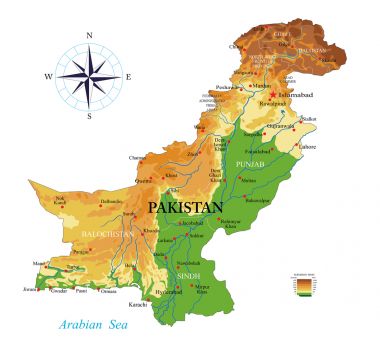Christian sentenced to death under Pakistan's blasphemy law

An anti-terrorism court in Pakistan on Saturday handed the death sentence to a Christian for allegedly sharing a "blasphemous" video on a social media platform despite lack of evidence, his attorney said.
Sahiwal District Anti-Terrorism Judge Ziaullah Khan delivered the sentence to 27-year-old Ehsaan (nickname "Shan") Masih under Section 295-C of the Pakistan Penal Code, which mandates the death sentence for blaspheming Muhammad, the prophet of Islam.
Masih's lawyer, Khurram Shahzad Maan, said Masih testified that he had categorically denied creating or posting any blasphemous content on social media.
"The police recovered Masih's phone from his house and sent it to the Punjab Forensic Science Agency (PFSA) for examination," Maan told Christian Daily International-Morning Star News. "The PFSA report concluded that no blasphemous material was found on the accused's phone or TikTok account."
A police officer was the complainant against Masih, and all prosecution witnesses were also police officials, the attorney said.
"Despite there being no direct evidence against Masih, the court relied on the statements given by the prosecution witnesses and sentenced him to death, which is a gross miscarriage of justice," Maan said.
Masih was also sentenced to a 10-year jail term under Section 295-A, blaspheming Islam, and he was convicted him under Section 11 of the Prevention of Electronic Crimes Act (PECA) and Section 7(1)(g) of the Anti-Terrorism Act, resulting in prison terms of seven years and five years respectively.
Sahiwal police arrested Masih on Aug. 19, 2023, accusing him of sharing on his TikTok account a video containing a letter that triggered Aug. 16 Jaranwala riots by Muslims furious over its alleged blasphemous content.
Maan said the First Information Report against Masih was initially registered under sections 295-A and 295-B (defiling the Quran) of the blasphemy statutes, along with sections related to electronic crimes and anti-terrorism.
"Section 295-C, which carries a mandatory death sentence for insulting Islam's prophet, Muhammad, was added later on the insistence of the prosecutor," he said. "Implicating Masih in 295-C is absurd, because he had not uttered or written anything derogatory against Prophet Muhammad; he was just accused of sharing the alleged blasphemous letter."
The attorney said the harsh verdict was unjustified because the matter was a clear case of "no evidence."
"The letter in question had been circulating on social media due to the Jaranwala incident, and it is a fact that Ehsaan Masih did not author it," he said. "Also, no one witnessed him uploading or sharing the controversial letter on his social media account."
The Organization for Legal Aid arranged for Maan to provide legal support to the impoverished Masih, who worked at a brick kiln.
"We are devastated by the verdict," Masih's elder brother, Yousaf Masih, told Christian Daily International-Morning Star News, "but we have faith in the Lord that He'll make a way for my brother's freedom. We are looking for a good lawyer to challenge the sentence in the Lahore High Court."
The family belongs to the Associated Reformed Presbyterian Church in Sahiwal, he said.
Minorities Alliance Pakistan (MAP) President Advocate Akmal Bhatti said the verdict contained glaring loopholes.
"The prosecution failed to provide concrete evidence in support of the allegations, while all the witnesses were police officials," Bhatti said. "The witnesses have said on record that neither the video was created nor was it shared on the social media in their presence."
Even if Masih had shared the video without considering the consequences, at best he should have been charged under the PECA laws, Bhatti said.
"It's a fact that he has not said nor written anything insulting for Islam's prophet, nor committed any terrorism, so convicting him under these sections is uncalled for," Bhatti said.
The MAP chairman also criticized police for adding terrorism charges in blasphemy cases.
"This is being done mainly under the pressure of Islamist extremist groups to target minority communities, especially Christians," he said.
The superior judiciary must take notice of this harsh sentence as well as lacunas in the prosecution's case and accept Masih's appeal, he stressed.
National Council of Churches in Pakistan President Bishop Azad Marshall was also critical of the judgment.
"The video in question was circulating widely on the social media since Aug. 16, 2023, and was even present in the phones of several Muslims, including police officials," Marshall said. "Does it make all these people blasphemers? Absolutely not."
Marshall said the excessive sentence also vindicated Christians' concerns that justice could not be expected for blasphemy suspects from trial courts.
"In over 90 percent of blasphemy cases, the trial courts have convicted the accused even if there was no evidence against them," he said. "This is done due to fear and pressure of the religious groups. Our judges do not realize the agony the victims have to suffer for years in prison until the superior courts discharge the cases on grounds of weak evidence."
At the same time, the same courts are more than willing to grant bail to perpetrators of religiously-motivated violence, he said.
"In the Jaranwala cases, only a few are expected to go on trial, as a majority of those involved in attacking churches and homes of Christians have walked free on bail," he said. "This discrimination in dispensation of justice does not bode well for the country."
On Aug. 16, a mob attacked several Christian properties in Jaranwala, ransacked more than 20 churches and destroyed at least 100 houses following false accusations of blasphemy against two Christian brothers. The two brothers were later exonerated from blasphemy charges by the Anti-Terrorism Court in Faisalabad. Another Christian bearing personal enmity toward them had framed the brothers, according to police.
Officers registered 22 cases under the Pakistan Penal Code and anti-terrorism law and arrested more than 100 people for rioting in Jaranwala, but none have been convicted so far.
Pakistan ranked seventh on Open Doors' 2024 World Watch List of the most difficult places to be a Christian, as it was the previous year.











